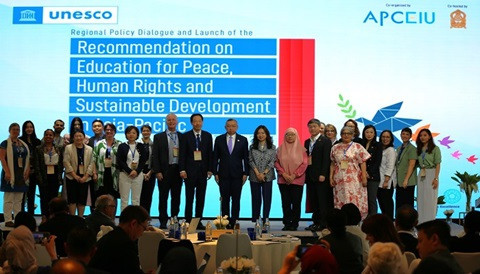
GCED Basic Search Form
Quick Search
Вы здесь
Новости

Regional Policy Dialogue and Launch of the Recommendation on Education for Peace, Human Rights and Sustainable Development in Asia-Pacific was held from 5 to 7 June 2024 in Bangkok, Thailand. This landmark event was co-organized by UNESCO and APCEIU, with support from the Centres of Asia-Pacific Excellence (CAPEs), the New Zealand Centre for Global Studies, and Sophia University, Japan, and hosted by the Ministry of Education of Thailand. The overarching goal of the event was to raise awareness on The Recommendation on Education for Peace and Human Rights, International Understanding, Cooperation, Fundamental Freedoms, Global Citizenship and Sustainable Development (hereafter referred to as the Recommendation) and facilitate discussions on implementation priorities at the regional level.

On Day One, the event began with opening remarks from Soo Hyun Kim, Director of the UNESCO Regional Office in Bangkok, and welcoming remarks from Hyun Mook Lim, Director of APCEIU, and Police General Permpoon Chidchob, Minister of Education, Thailand. They expressed hope that the regional roadmap, to be developed at the event, will inspire policymakers, educators, and communities to implement impactful initiatives that enhance education's role in shaping a more just, peaceful and sustainable future.
In the first session, Christopher Castle, Director of the Division for Peace and Sustainable Development at UNESCO, emphasised the comprehensive nature of the Recommendation and the necessity for a holistic approach. He also outlined upcoming milestones aimed at supporting its effective implementation, including the launch of the Global Implementation Guide.
Following this, Miki Sugimura, Professor at Sophia University, presented research findings to enable participants to grasp the current landscape of education for peace, human rights, and sustainable development in the region, including its challenges and opportunities.

In the second session, youth representatives engaged in gender, mother tongue education, environmental, and peace initiatives illuminated the room by sharing diverse proposals on the future direction of education as they envision it.

The parallel sessions facilitated in-depth discussions on key action areas outlined in the Recommendation, such as Policy, Capacity Development, and Monitoring; Curriculum, Pedagogy, and Assessment; Teacher Development, Teaching and Learning Materials; and Life-wide Learning and the Learning Ecosystem. These sessions inspired participants to connect current issues with their own contexts, forming the basis for the development process of a draft regional roadmap.


On the second day, all participants were grouped for field visits into three themes: 1) Health and Wellbeing, 2) ESD, and 3)GCED. Participants observed how these topics are applied and practiced in real-life settings.
With all the insights and information gathered, participants convened around the table to identify priorities for each action area in the Recommendation and to explore existing resources to support its implementation. They discussed crucial issues within their respective contexts and shared ideas on how to compose the draft regional roadmap.


On the last day, all participants reviewed the collated draft regional roadmap and provided feedback. Faryal Khan, Programme Specialist for Education at UNESCO Bangkok, concluded the event by highlighting the importance of upcoming global and regional platforms, emphasising the need for local and national-level actions to advance these critical dialogues.

Developed collaboratively through the wisdom and participatory process of over 100 participants from 27 countries in the Asia-Pacific region, the draft regional roadmap will be further reviewed and agreed upon by UNESCO and the Asia-Pacific Member States, with the final version scheduled for future sharing. While anticipating regional launches in Africa, MENA, and LAC, alongside the launch of the Global Implementation Guide in November this year, this inaugural regional roadmap will set an example as a powerful tool for policymakers, educators, and grassroots activists to implement the new Recommendation.
APCEIU remains committed to continuing support for the implementation of the Recommendation, the sole global standard-setting instrument outlining how education can promote lasting peace and advance human development at national, sub-regional, regional, and international levels.

